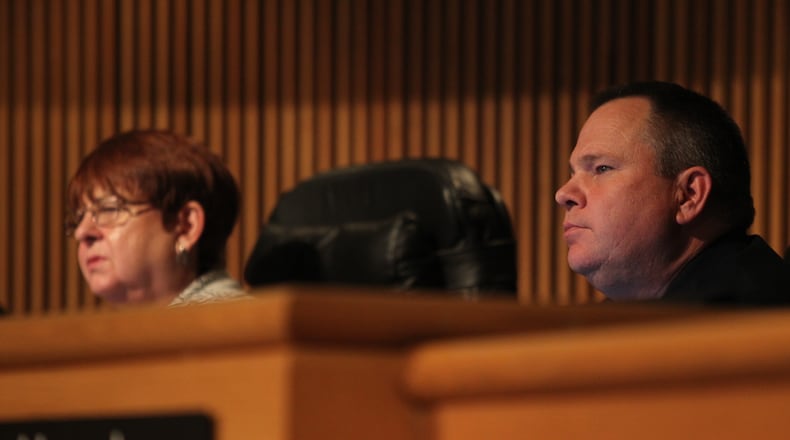In the three weeks since his controversial social media activity was reported by The Atlanta Journal-Constitution, Gwinnett County Commissioner Tommy Hunter has faced hordes of protesters and repeated calls for his resignation.
But the first formal action taken against Hunter came Monday in the form of an ethics complaint — the first ever filed under an ordinance Gwinnett County adopted more than five years ago as another high-profile controversy unfolded.
The complaint, filed by two local attorneys on behalf of an Atlanta woman, suggests the Jan. 14 Facebook post in which Hunter called civil rights icon and U.S. Rep. John Lewis a "racist pig" reflects a man incapable of fairly serving his constituency. The filing has the potential to trigger the first-ever assembly of the Gwinnett County Ethics Board, a full investigation and possible penalties that range from written reprimand to removal from office and "referral to proper criminal authorities."
Hunter has apologized for his “choice of words” and said he won’t resign — and his camp seems unfazed by Monday’s development.
“Did the filing attorneys really pass the bar?” Seth Weathers, a consultant who has acted as a spokesman for the commissioner, wrote in a text message to The AJC.
An awakened ordinance?
Gwinnett’s current code of ethics was adopted in Nov. 2011, as the Board of Commissioners grappled with a corruption scandal that ultimately claimed three elected officials: one that resigned to avoid prosecution on a perjury charge, one that took a probation-heavy plea deal and one that spent time in federal prison.
That scandal involved shady land deals and bribes, and the code of ethics it helped birth focuses primarily on preventing more of the same. It's heavy on words like "disclosure" and "special treatment" and "conflict of interest."
The complaint filed against Hunter, though, hones in on three more generic sections of the ethics code. Specifically, it suggests Hunter’s social media activity violated mandates for county employees and elected officials to “never engage in conduct which is unbecoming to a member or which constitutes a breach of public trust.”
It also cites two similar sections.
Christine Koehler, one of the attorneys who filed the complaint, said she feels it’s valid because commissioners “serve at the pleasure of the public.”
“Mr. Hunter humiliated his whole constituency, and he’s insulted nearly half,” she said. In his John Lewis post, Hunter also referred to Democrats as “Demonrats.” In November’s election, about 49 percent of voters in Hunter’s District 3 cast their ballots for his Democratic challenger.
The complaint is filed on behalf of a woman named Nancie Turner, whose address is listed in Atlanta. Koehler said there’s no mandate for someone bringing an ethics complaint to be a county resident.
Koehler, fellow attorney Helen Kim Ho and Turner plan to further address their complaint during a press conference prior to the Board of Commissioners’ Tuesday afternoon meeting.
Dozens of protesters have clogged the public comment sections of recent board meetings, speaking against Hunter for hours, and they plan to do the same Tuesday.
How does it work?
Even under the 2011 ordinance, Gwinnett County has no standing ethics board.
If Monday’s complaint, which was served to the county attorney, meets the “technical requirements,” it will then be forwarded to Hunter and four other entities: the Gwinnett County Board of Commissioners, the Gwinnett County District Attorney’s Office, the Gwinnett County Bar Association and the Association of County Commissioners of Georgia.
All five parties — including Hunter— would then appoint representatives to serve on the ethics board. After giving Hunter 30 days to file a formal response to the complaint, the board would largely set its own schedule for its investigation.
A simple majority vote of “sustained” or “not sustained” would eventually decide Hunter’s fate.
THE PATH OF A GWINNETT COUNTY ETHICS COMPLAINT
• Once a complaint is filed with the county attorney’s office, a staff member determines if it meets the “technical requirements.”
• If it does, a five-person board of ethics is assembled, with representatives appointed by the Gwinnett County Board of Commissioners, the Gwinnett County District Attorney’s Office, the Gwinnett County Bar Association and the Association of County Commissioners of Georgia. The subject of the complaint also appoints a representative.
• Once an investigation is completed, a simple majority vote of “sustained” or “not sustained” decides the complaint’s fate.
• If sustained, possible penalties range from written reprimand to removal from office and “referral to proper criminal authorities.”
About the Author
Keep Reading
The Latest
Featured





